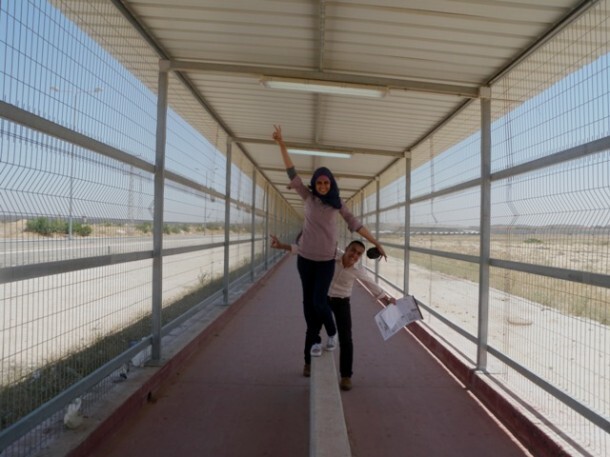20 March 2012

This is how excited I was when I first crossed through Erez crossing last May. I didn’t know what to expect. I didn’t know I would go through strip search.
I should have been filled with eagerness to join a reunion of the leadership program I attended in the United States, and once again gather with my friends from there and all over the Middle East and North Africa in Jordan.
But something inside made me want to stay in Gaza. When my friends asked me if I was excited to leave, I hesitated to answer. Part of me was certainly thrilled to travel, especially since if I missed this reunion, I didn’t know if there would ever be another chance to meet my friends I met in the US. Simply put, I have no control over my movement. Israel occupies our land, sea and air, and even occupies our footsteps. But thanks to the US’ alliance with Israel, the American embassy could guarantee permission for me to leave.
“You deserve a break” — my friends told me this frequently, trying to convince me to make the most of my travel. Yet I couldn’t separate myself from the harsh circumstances my people are bound to live in. My hesitance came from a feeling of guilt about leaving the Gaza Strip amidst the tension my people suffer due to the continuing blackout, the fuel crisis and the unstable political situation under the constant threat of more Israeli attacks.
`I applied for a permit to leave on 23 February, but the Israeli occupation was only generous enough to allow me to cross through Erez on 1 March, not even a day before my reunion started. Only Israel decides when I should leave.
It was my third experience crossing Erez, so I was familiar with the humiliating procedures Palestinians are subjected to at the checkpoint. One of my worst memories is attached to this place. Many people have no idea about how we are humiliated, how badly we are treated, as if we are less than human beings.
Imagine how deep the pain feels when you go through nude inspection. I went through this psychological torture, but thankfully I was strong enough to keep my pain inside, hold my head held high, and go on. But this memory sticks in my head, which made it difficult for me to imagine that I might go through this again.
I prayed that my third crossing would be less difficult. Thankfully, it was. I could pass without being forced to take off my clothes, but there was no way I could pass without having my suitcase turned inside out. I was ready at around 10am to continue my journey through more checkpoints and the Allenby crossing between the occupied West Bank and Jordan.
Mustafa, a taxi driver originally from Jerusalem, was waiting for me on the Israeli side of Erez. When I discovered that he was sent by the American embassy to take me to Jericho, my smile became very big.
Last June, on my way to the US, I crossed through Erez for the second time. After considerable nagging, I managed to convince the taxi driver, who was Mustafa’s uncle, to let me walk in Jerusalem. Mustafa accompanied me for my first tour inside the Old City of Jerusalem, and I kept him walking for an hour and a half. I hoped that I would get to have another tour, especially since we crossed with relatively little waiting.
I thought I was a very good nagger, but I actually failed that time. I felt bad, but he felt worse for leaving me disappointed, since the US embassy’s orders were too strict for him to disobey.
I knew that it would take triple the time actually needed to arrive in Jordan due to barriers that Israel puts in our way, hoping to humiliate us and make us feel low. They never succeed.
I witnessed the degrading treatment of an old woman from Nablus, who lives in Balata Refugee Camp. She wore a jilbab, a long, loose-flowing dress that devout Muslim women wear. She stood in front of me in line. When she passed through the door, the alarm started ringing, since she had forgotten some coins in her pocket. Then she stepped backward and set them aside. She tried again and passed without the alarm sounding. However, the Israeli soldiers called her out of the line and ordered her, with loud voices, to go back through and take off her jilbab. She tried to argue with them, but they left her no choice.
She stood and fixed her eyes full of anger straight at the soldiers, took it off, and kept walking with pride. When I told her that I was sorry for what she had been through, she replied, “Don’t be sorry, darling. Those Israeli soldiers should be sorry for themselves. They think they humiliate us, but they actually remind us of our passionate desire as Palestinians for dignity and freedom. We’ll go on resisting and giving birth to heroes. Israel’s end will be at their hands. No matter how long the oppressed people remain oppressed, one day they’ll be victorious!”
This is the typical Palestinian woman, whose role in the popular resistance is without limit. They believe that the struggle is cumulative. If one doesn’t witness the impact of his or her sacrifice, the following generations will feel it, and enjoy its resulting victory. Their core role is to raise strong leaders, who will carry the responsibility for bringing freedom and dignity to Palestinians.
After meeting with this inspiring and strong woman, I felt more determined than ever to continue my peaceful resistance against the tyranny and oppression of the Israeli occupation. I also sensed how large my duty to my homeland will be as a Palestinian mother.
She impressed me, and her strength inspired me and put a smile on my face. I stayed with her to help her with her luggage, then rode the last bus to take us to our final destination, the Jordanian border, where our tiring travel through checkpoints and crossings ended.
Come back tomorrow to read about my journey in Jordan.






Comments
Shameful Israeli Conduct
Permalink Steve Grumman replied on
I find the conduct of the Israelis totally abusive and repugnant. And I identify.
Sad to say, in my own country, America, I faced a situation similar to what the Palestinian lady in her jilbab faced at the hands of the Israelis. My angering treatment was at the hands of the TSA in Los Angeles airport. After honestly forgetting to remove my computer from my hand-carried bag, a TSA agent verbally abused me and then subjected me to a very thorough search, including a body search. If he thought he was teaching me a lesson he was gravely wrong. I was not embarrassed. I was angered. I committed no crime and am all too well aware that I was not due such base treatment. That it happened in my own country only made the situation worse.
We need to peacefully resist this bad conduct and actively seek its end. Security does not mean bad conduct nor abuse.
Human beings are due humane treatment. Anything less is wrong.
Great work as always Shahd
Permalink Éanna replied on
Great work as always Shahd